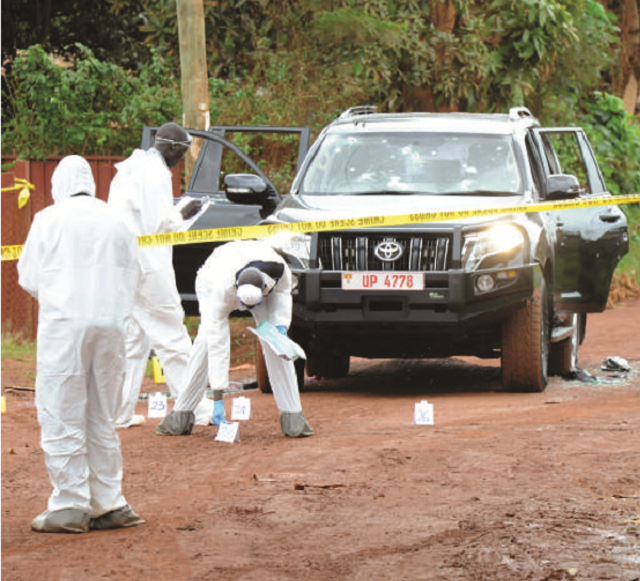
The March 17 killing of Assistant Inspector General of Police (AIGP), Andrew Felix Kaweesi, one of the topmost officers of the force is the latest case to put the government and specifically police on the spot. By striking successfully again, the assailants are proving that they have capacity to snatch any target, even under police watch, critics say.
This specific target has raised the stakes. Like the police boss, IGP Kale Kayihura told journalists at the scene of Kaweesi’s slaying; the assailant’s aim was to hurt police.
“They have been saying that they will hit us where it hurts most,” Kayihura said.
Many commentators have told The Independent that they agree that the attackers may have wanted to hit police where it hurts most. But apart from this, the attackers seem to have made the point that they have capacity to outwit and attack the security agents themselves.
But, when he visited the deceased’s home on March 19, President Yoweri Museveni said criminals who, he said, have infiltrated the police force might be contributing to the insecurity and killings. Museveni specifically pointed at the criminal investigations department and asked Kayihura to clean up the house starting with the CIID.
Publicly, the cases has reawakened concerns over a sense of insecurity worsened by the increased proliferation of guns in Uganda for which they partly blame the homicides.
Maj. Muhammad Kiggundu, who was a key contact on Muslim affairs for the security agencies, was also trailed from his home, the rear tyres of his vehicle were punctured with bullets, forcing the truck to drift off the road and stop as his attackers shot him.
Before Kiggundu, it was Joan Kagezi, a Senior Principal State Attorney, who was also trailed by two motorbikes as she left work returning home. The assassins waited until Kagezi stopped at her usual fruit stall, took her out and sped off.
Without arrests or details of evidence pinning one group or the other, the investigators appear to suspect that Kagezi’s assassination was linked to her work as the Assistant Director of Public Prosecution at the war crimes division of the High Court. In that position, she prosecuted most top cases. One case involved 13 suspects of the 2010 twin bomb attacks in Kampala. Al shabaab claimed responsibility for the attack in which over 80 lives were lost, and Kagezi was due in court the next day when she was bumped off.
Apart from the three, a host of Muslim clerics has been targeted and killed in a similar way. Before Kagezi was gunned down, police was for months grappling with a string of killings of prominent sheikhs.
On December 28, 2014, Sheik Bahiga Mustafa was shot dead in his car outside a mosque along Entebbe Road. He too was with his children. Sheik Mustafa was killed just three days after another prominent Muslim, Sheik Abdul Qadir Muwaya was killed by gunmen in Mayuge on Christmas day. He was the leader of the Shia Muslim Community in Uganda. Before that, on April 20, 2012, another to Muslim; Sheikh Abdu Karim Ssentamu had been shot at in Kampala.
Two months later, in June, another Muslim cleric, Abasi Abubaker Kiweewa, was shot dead at his supermarket in Kyanja, a Kampala suburb. Again two months later, two other prominent Muslims Yunusu Madungu and Muhammad Maganda, were gunned down on Eid el-Fitr in Bugiri district.
Gen. Kayihura, initially said Kagezi had been killed by Allied Democratic Forces (ADF), a ragtag group of fighters based in the neighbouring DR Congo who oppose the government of President Yoweri Museveni. Later, however, the police boss pointed at the Somali Islamist group; al Shaabab as the killers. The killers of the Muslim clerics have also previously been linked to these groups. None of these groups could possibly have targeted Kaweesi. If that is proved, then who is targeting police?
But Kaweesi was also a key player in investigations or arrests in almost all these cases. Following Kiggundu’s murder for instance, Kaweesi defended the arrest of Sheikh Yahaya Ramathan Mwanje, the then acting Amiir Ummah at Nakasero, saying the Sheikh had allegedly called for the death of Kiggundu days earlier. Kaweesi was also involved in key meetings where police was reaching out to leaders of different Muslim factions to reconcile and put an end to the blood bath. In some of these meetings, police leaders were told to back off, insiders say.
But in all these murders, the police leadership, sometimes using confessions from suspects, has been rushing to make public statements and public arrests. However, in all these murders, police is yet to make public the findings of investigations or to get a conviction.
Many hope that Kaweesi’s case, which seems to have had a major chilling effect on the force, can get the police chief to refocus resources from political intelligence, which has tended to be police’s major focus under his 12-year reign, to criminal intelligence to crackdown on the criminals, who appear to be getting emboldened by every successful hit.
RELATED STORY: The killing of Kaweesi (click)
****
editor@independent.co.ug
 The Independent Uganda: You get the Truth we Pay the Price
The Independent Uganda: You get the Truth we Pay the Price


